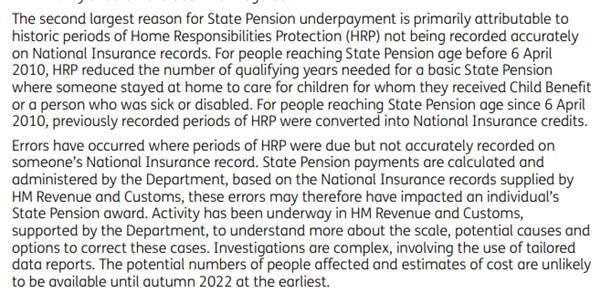“Mothers missing millions” - New campaign launched to help mothers fix an error in their state pension
Media centre
1 September 2022
A new campaign has been launched by consultants LCP to help thousands of mothers secure millions of pounds in underpaid state pensions as DWP admits a new category of error in its annual report.
Since 1978/79, the state pension system has included measures designed to help protect the position of parents (in practice mainly mothers) who may have gaps in their National Insurance record because of time spent out of paid work bringing up children. The system was originally called ‘Home Responsibilities Protection’ (HRP) and is now known as National Insurance credits.
Unfortunately, this system is not working as it should.
In its July 2022 Annual Report, DWP admitted that missing HRP is now the ‘second largest’ source of error in state pensions (coming on top of the £1.5 billion in errors for certain married women, widows and the over 80s, currently the source of a major correction exercise). The error was unearthed only when DWP undertook its first full review of State Pension fraud and error since 2005-06, which included phoning up pensioners in receipt of low state pensions. This helped to identify that there were some cases where parents should have been receiving credits for time at home with children but this was not on their NI record.
The DWP annual report says it is working with HMRC to assess the scale of the problem, but the results will not be known before the Autumn at the earliest. However, a previous attempt by DWP to fix this problem more than ten years ago (after it was raised by Steve Webb who was at that point an opposition MP), resulted in lump sum payments of £83 million to 36,000 people, as well as an average pension increase of £10 per week (see note 3). The current errors could easily be of a similar or greater scale.
To help parents see if this issue applies to them, and to put things right if it does, LCP has now launched a campaign website – www.lcp.uk.com/mothers-missing-millions - which takes parents through three steps:
Step 1. Check if you are entitled to HRP / NI Credits
Step 2. Check your NI record to see if this is showing
Step 3. If not, complete the relevant form to get it added to your NI record
In theory, if DWP and HMRC agree that there is a significant error, they may launch a large scale correction exercise which may pick these errors up at some point. But given that the current exercise to correct state pension errors is due to run until late 2024, there is a risk that these new errors may not be fixed for several years. In the meantime, parents will be continuing to lose out through underpaid state pensions, which is why fixing the problem for themselves may be the best strategy.
The following two case studies are of women who have successfully got HRP added to their NI record in recent weeks and received a significant state pension boost as a result. In the second case, Mrs James would not have received any pension at all without the inclusion of HRP.
|
Case study 1 – Mrs Lorraine Wainwright Mrs Lorraine Wainwright (68) lives in Gloucestershire with her husband Eddie (67). The couple have two daughters and Mrs Wainwright was looking after them during the 1970s and early 1980s. For many years thereafter, Mrs Wainwright ran a care home for people with learning disabilities alongside her husband. In early 2020 Mrs Wainwright looked into claiming her state pension, but she discovered that she would not get a full pension because she only had 31 ‘qualifying years’ towards her pension rather than the necessary 35. But she also realised she was not getting credits for the years from 1978/79 onwards when she was not in paid work and looking after her family. She first tried to have her record put straight in early 2020, but the matter was still unresolved two years later. After Steve Webb took up her case, HMRC accepted that Mrs Wainwright was entitled to HRP for seven years, which is enough to give her a full pension. Mrs Wainwright has now received a lump sum of around £1,500 in arrears for the underpayment since she retired, and her regular state pension will now be increased by over £20 per week up to the full flat rate. Mrs Wainwright said: “I would encourage any parent who spent time bringing up children to check that they are getting credits on their NI record. If I had not checked my own record carefully, it is quite possible I would still be getting the wrong rate of pension. I welcome this new campaign, which could help thousands of mothers to get their dues”. |
|
Case study 2 – Mrs Helen James Mrs Helen James (67), lives in South Wales and has had various jobs including working in a school and in a local shop, as well as looking after her children and young grandson. Mrs James and her husband have two children who were born in the early 1970s, and Mrs James spent much of the 1970s and 1980s raising her family. When she came to apply for her pension in July 2021 she was told that she was not entitled to anything because she did not have the minimum required 10 years of contributions. This didn’t seem right to Mrs James, and eventually she got in touch with Steve Webb who took up her case. Mrs James made a successful claim for 12 years of Home Responsibilities Protection from 1978/79 to 1989/90 and this meant she was now entitled to a pension. Mrs James will receive a weekly pension of just over £79 and a lump sum of over £4,000 for the money she should have received since July 2021. Mrs James said: “It is quite wrong that I was told I wasn’t entitled to any pension, and if my daughter hadn’t read press coverage about the issue I might still be getting nothing. I would encourage any mother who has been turned down for a pension to challenge the decision and get it checked”. |
Commenting, Steve Webb, partner at LCP, said: “The DWP has admitted that even more people are being underpaid state pension than previously thought, with a whole new category of errors coming to light. Yet again, this error overwhelmingly affects women, and undoubtedly means that many thousands have been underpaid for years. Rather than wait for the government to fix the problem, I would encourage anyone who has received child benefit since 1978/79 to check that the relevant credits are on their NI record. If not, this can be fixed by filling in a form, and the result could well be a higher pension and a worthwhile lump sum”.
** ENDS **
Notes to editors:
- With regard to Mrs Wainwright’s case, an HMRC spokesperson said:
“Mrs Wainwright
- Mrs Wainwright first contacted us in June 2020 enquiring about HRP
- We sent the customer a form CF411 which we received back at the end of July 2020.
- We tried to telephone the customer for more information but could not get an answer, so we wrote to her requesting the information.
- In March 2022 we received another form CF411 applying for HRP.
- HRP has been awarded for the period 6 April 1981 to 5 April 1988.
- We have written to Mrs Wainwright to inform her.
- It will be for DWP to calculate how much state pension Mrs Wainwright is now eligible for”.
With regard to Mrs James’ case, HMRC said:
Mrs James
- HRP has been awarded for the period 6 April 1978 to 5 April 1990
- We have written to Mrs James to inform her.
- It will be for DWP to calculate how much state pension Mrs James is now eligible for.
- The DWP annual report for 2021/22, published in July 2022 included the following (p71):

(Source: Annual Report and Accounts 2021-22 (publishing.service.gov.uk))
- The results of the previous attempt to correct this error can be found at: Microsoft Word - 110615 - HRP correction exercise ad hoc analysis - FINAL.d… (publishing.service.gov.uk)

